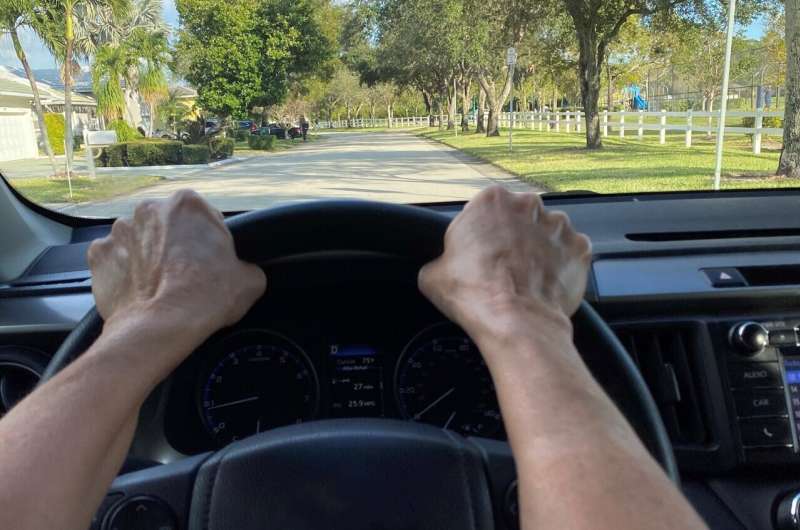This article has been reviewed according to Science X's editorial process and policies. Editors have highlighted the following attributes while ensuring the content's credibility:
fact-checked
trusted source
proofread
'Fit2Drive' transforms assessing older drivers with cognitive decline

As the world's population ages, so does the proportion of older drivers on the road. Safe driving requires adequate memory, perceptual and motor skills, and executive function abilities. Although individuals with severe Alzheimer's disease and related dementias (ADRD) are no longer able to drive safely, changes in driving performance may start at the preclinical stage of AD.
The decision to stop driving due to cognitive decline is difficult and contentious for older adults, their families and clinicians alike. While there are numerous cognitive tests and on-road evaluations available, clinical practitioners have reported that they have limited training as well as time constraints to administer these tests to determine whether a patient should stop driving. Moreover, objective evidence is difficult to obtain.
With the help of an evidence-based calculator called "Fit2Drive," researchers from Florida Atlantic University have made it easy to administer and evaluate an in-office test to predict an older individual's probability of passing an on-road driving test. Based upon brief, easily administered cognitive tests, Fit2Drive provides an objective estimation of the ability to drive for those with cognitive concerns.
For the study, FAU Christine E. Lynn College of Nursing and Charles E. Schmidt College of Science researchers created an algorithm to rapidly generate the prediction for an individual patient. They combined 12 cognitive tests and on-road evaluation data from two samples: patients from FAU's Louis and Anne Green Memory and Wellness Center data repository and older drivers from the community.
The cognitive tests included the Mini-Mental State Exam (MMSE), a well-known 30-point dementia screening tool; and Trail Making Tests A, a test of visual tracking; and B, to evaluate cognitive flexibility and measure executive functioning. In total, 412 study participants, ages 59 to 89, completed the cognitive assessments and an on-road driving test.
Results of the study, published in the Journal of the American Medical Directors Association, showed that the Fit2Drive algorithm demonstrated a strong 91.5% predictive accuracy.
A step-by-step examination of the predictive power of the results and a number of combinations, showed that the MMSE highest score and Trails B time in seconds accounted for the highest proportion of unique variance in the predictive model with minimal additional increase in predictive strength contributed by additional test scores.
Findings also showed statistically significant differences in the on-road evaluation results across the two samples, with most of those who failed the on-road driving test coming from the repository data set (53.7%) compared with those from the community sample (7.9%).
"The anger, tears and frustration on the part of the individual patient and the lack of objective data to guide clinician recommendations are the driving forces behind our efforts to develop a highly accurate, evidence-based predictor of the ability to pass an on-road driving test," said Ruth Tappen, Ed.D., senior author and the Christine E. Lynn Eminent Scholar and Professor, FAU Christine E. Lynn College of Nursing.
"Fit2Drive results are intended to provide the clinician with useful objective evidence that may be shared with the patient and family concerned about the advisability of continuing to drive, a situation that is a major life event for them and a challenge for primary care providers."
To identify the smallest number of cognitive test results that could predict a person's likelihood of passing an on-road driving test, researchers entered the in-office test results into a logistic regression (statistical model) using pass or fail on the on-road test results as the outcome on which the possible predictor variables were regressed.
The binary pass-fail outcome allowed the predictive model to assess the sensitivity (a true positive) and specificity (a true negative) of the predictive outcomes compared with the on-road evaluation. From this data, researchers created a contingency table from the four possible outcomes (true positive, false positive, true negative, false negative).
The overall combination of the sensitivity and specificity is then graphed (called an ROC curve), and the AUC provides an estimate of the overall accuracy of their predictors.
"Printing a table with every possible combination of the MMSE score and Trails B time would yield 176 pages, which would be awkward for any clinician to use during a patient consultation," said Tappen.
"Therefore, we developed a calculator based on an equation derived from our data to provide easy access to the requisite data. When the results of a patient's MMSE and Trails B time scores are entered, the calculator provides the clinician with the probability of a patient's ability to pass an on-road driving test."
The Fit2Drive calculator can be accessed at fit2drive.org. Researchers recommend the MMSE be administered first, followed by administration of Trails A and Trails B, which is how the tests were administered in this study. Providers can download the application from the Fit2Drive website to an Android or iOS mobile device and use a smartphone to enter the data.
"As our ability to administer cognitive tests online increases, we may be able to create an entirely online version of Fit2Drive to further streamline its use," said Tappen.
More information: Ruth Tappen et al, Fit2Drive: Screening Older Drivers with Cognitive Concerns, Journal of the American Medical Directors Association (2024). DOI: 10.1016/j.jamda.2024.105054




















